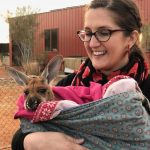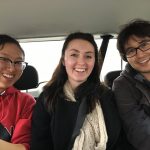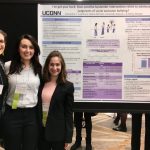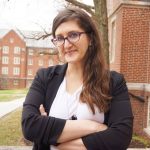
Today’s Friday Feature is Alaina Brenick, Ph.D.!
What is your name?
– Alaina Brenick, Ph.D.
What is your current position at UConn?
– Associate Professor in Human Development and Family Sciences and Associate Director of the Center for the Study of Culture, Health, and Human Development.
Where did you study & what degree were you awarded?
– I received my Ph.D. in Human Development with a specialization in Developmental Science from the University of Maryland. I then received a postdoctoral fellowship from the Friedrich Schiller Universiteit of Jena Graduate College of Human Behaviour in Social and Economic Change, Jena Germany.
Where are you from?
– Since you asked, I am proudly born and raised in Baltimore, Maryland (go ravens!).
What is the focus of your research?
– My research examines individual, micro-, and macro-level factors that contribute to intergroup conflict, societal inequities, and the conditions necessary for reducing prejudice, discrimination, and victimization across development. Specifically, I analyze how various groups of youth in the U.S. and in other regions of the world—sometimes with vastly different societal structures, norms, and expectations—experience, reason about, and respond to intergroup peer relations and group-based victimization (e.g., discriminatory bullying or exclusion). My work provides a fundamental knowledge base that can be translated into multifaceted, contextually, and developmentally appropriate intervention programs ranging from mindfulness training to intergroup contact, designed to promote compassion, empathy, social equity, and positive intergroup relations.
Can you tell us more about your ongoing studies?
– I have a number of ongoing studies at the moment: one assesses longitudinal interventions carried out in the Middle-East with Palestinian- and Jewish-Israeli children to reduce outgroup prejudice, and increase positive outgroup regard and behaviors in intergroup scenarios. A second study is assessing the bullying experiences of Latinx and Muslim-Arab immigrant youth in the U.S. following the last presidential election to the present day and exploring the protective and risk factors that may be unique to these groups. A third study examines how youth evaluate different scenarios of intergroup bullying and what type of bystander behaviors they believe are appropriate based on the ethnic makeup of the bully-victim-other bystander group. We have many more studies starting including resiliency in refugees, compassion and mindfulness interventions with kindergarteners, and prejudice reduction interventions pre- and post- covid19, to name just a few.
What are your ultimate goals?
– My ultimate goals are giving voice to marginalized youth and helping empower all youth to work for social justice.
What do you like to do in your free time?
– I love indoor gardening (I have about 40 plants in my indoor plant family and sneaking more into my home every chance I can get), I crochet and knit–mostly cute creatures for my nieces and nephews, I love to go walking and hiking, and I love to travel all over the world. The thing I love the most, though, is spending time with my niblings and being the world’s best tanta—my most important title.
The Developmental Approaches to Identities, Inequities, and Intergroup Relations Lab
(learn more about Dr. B’s work, the lab, and all our projects at: www.alaina-brenick.uconn.edu)



